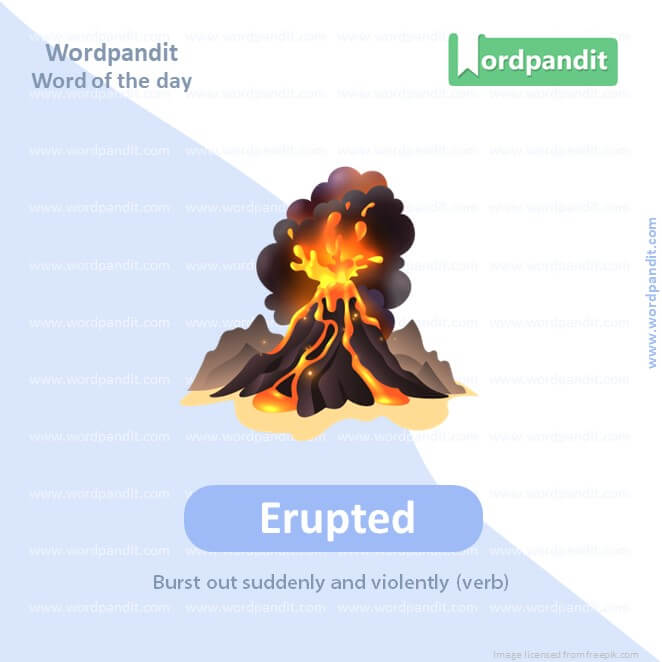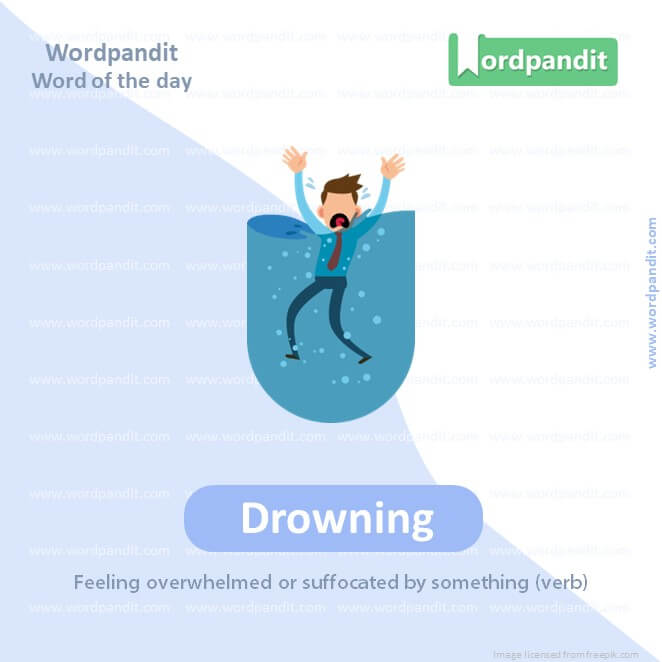Daily Vocabulary Words: List of Daily Used Words in Leading Indian Newspapers
Hi there. Welcome to this special section @ Wordpandit. Our endeavour here is straightforward: highlighting daily vocabulary words that you would come across in leading newspapers in the country. We have included the following newspapers in our selection:
• The Times of India
• The Economic Times
• Hindustan Times
• Mint
• Indian Express
We are putting in extensive work to develop your vocabulary. All you have to do is be regular with this section and check out this post daily. This is your repository of commonly used words; essentially, we are posting a list of daily used words. Hence, this has significant practical application as it teaches you words that are commonly used in leading publications mentioned above.
Visit the website daily to learn words from leading Indian newspapers.
WORD-1: Relinquished
CONTEXT: speculations continue about the BJP fielding Varun from Rae Bareli, as the seat has been relinquished by the Congress chairperson Sonia Gandhi, who because of health reasons will take the Rajya Sabha route to enter Parliament.
SOURCE: Hindustan Times
EXPLANATORY PARAGRAPH: When someone gives up or lets go of something willingly, it’s called relinquished. It’s like when you share your toys with a friend because you want to be kind.
MEANING: Giving up or letting go of something willingly (verb).
PRONUNCIATION: ri-LIN-kwished
SYNONYMS: surrender, yield, give up, abandon, renounce
USAGE EXAMPLE:
1. She relinquished her claim to the throne.
2. He relinquished his role as leader of the team.
3. They relinquished control of the company to new management.
4. Relinquishing control was a difficult decision.

WORD-2: Erupted
CONTEXT: Sonia Gandhi and her sister-in-law Menaka that erupted soon after Sanjay Gandhi’s death in June 1980.
SOURCE: Hindustan Times
EXPLANATORY PARAGRAPH: When something bursts out suddenly and violently, like a volcano spewing lava, it’s called erupted. It’s like when a balloon pops and the air rushes out.
MEANING: Burst out suddenly and violently (verb).
PRONUNCIATION: ih-RUPT-ed
SYNONYMS: burst, explode, flare up, break out, erupt
USAGE EXAMPLE:
1. The volcano erupted, sending ash into the sky.
2. Violence erupted after the controversial decision.
3. Cheers erupted when they won the championship.
4. Emotions erupted during the heated debate.
WORD-3: Praiseworthy
CONTEXT: The recent report of the Ram Nath Kovind panel on simultaneous elections is praiseworthy on several counts.
SOURCE: Hindustan Times
EXPLANATORY PARAGRAPH: When something or someone deserves praise or admiration, it’s called praiseworthy. It’s like when you do something really kind and everyone claps for you.
MEANING: Deserving of praise or admiration (adjective).
PRONUNCIATION: PRAZE-wur-thee
SYNONYMS: commendable, admirable, laudable, worthy, deserving
USAGE EXAMPLE:
1. Her actions were praiseworthy and earned her recognition.
2. The praiseworthy efforts of the volunteers helped many people.
3. The praiseworthy initiative led to positive changes in the community.
4. His praiseworthy dedication to his work was acknowledged.
WORD-4: Pragmatism
CONTEXT: the formation of alternative governments with the same set of legislators, the committee has displayed pragmatism and sagacity.
SOURCE: Hindustan Times
EXPLANATORY PARAGRAPH: When someone is practical and focuses on what can be done rather than what should be done, it’s called pragmatism. It’s like when you choose a simple toy because you know it will be fun to play with.
MEANING: Practical approach or mindset, focusing on what can be done (noun).
PRONUNCIATION: PRA-gmuh-tiz-uhm
SYNONYMS: practicality, realism, practical approach, sensible, logical
USAGE EXAMPLE:
1. Her pragmatism helped solve many problems efficiently.
2. The decision was based on pragmatism rather than idealism.
3. Pragmatism is important in business decision-making.
4. He approached the project with pragmatism and achieved success.
WORD-5: Sagacity
CONTEXT: the formation of alternative governments with the same set of legislators, the committee has displayed pragmatism and sagacity.
SOURCE: Hindustan Times
EXPLANATORY PARAGRAPH: When someone is wise and has good judgment, it’s called sagacity. It’s like when your grandma gives you good advice because she knows a lot.
MEANING: Wisdom and good judgment (noun).
PRONUNCIATION: suh-GAS-i-tee
SYNONYMS: wisdom, insight, discernment, intelligence, acumen
USAGE EXAMPLE:
1. His sagacity in financial matters saved the company from losses.
2. The leader’s sagacity guided the team through difficult times.
3. She admired his sagacity and sought his advice.
4. Sagacity is often gained through experience and learning.

WORD-6: Ratification
CONTEXT: There could be further debate if amendments to Article 172 pertaining to election to state assemblies would not require ratification by the states, there is no gainsaying that this step would require tremendous persuasion and perseverance by the Government of India to build consensus with the states.
SOURCE: Hindustan Times
EXPLANATORY PARAGRAPH: When something is officially approved or confirmed, it’s called ratification. It’s like when a teacher approves your homework after checking it.
MEANING: The act of formally approving an agreement or treaty, making it
officially valid (noun).
PRONUNCIATION: rat-uh-fi-KEY-shuhn
SYNONYMS: approval, confirmation, endorsement, sanction, authorization
USAGE EXAMPLE:
1. The treaty required ratification from both countries.
2. The board’s ratification of the plan was a significant step.
3. Ratification of the agreement was delayed due to legal issues.
4. The ratification process took longer than expected.

WORD-7: Perseverance
CONTEXT: There could be further debate if amendments to Article 172 pertaining to election to state assemblies would not require ratification by the states, there is no gainsaying that this step would require tremendous persuasion and perseverance by the Government of India to build consensus with the states.
SOURCE: Hindustan Times
EXPLANATORY PARAGRAPH: When someone keeps trying and doesn’t give up, even when things are difficult, it’s called perseverance. It’s like when you practice riding a bike until you can do it without falling.
MEANING: Continuing to do something despite difficulties or obstacles (noun).
PRONUNCIATION: pur-suh-VEER-uhns
SYNONYMS: persistence, determination, tenacity, resilience, endurance
USAGE EXAMPLE:
1. Her perseverance in studying paid off when she passed the exam.
2. Perseverance is key to achieving long-term goals.
3. He showed great perseverance in overcoming challenges.
4. The team’s perseverance led to success in the project.

WORD-8: Consensus
CONTEXT: There could be further debate if amendments to Article 172 pertaining to election to state assemblies would not require ratification by the states, there is no gainsaying that this step would require tremendous persuasion and perseverance by the Government of India to build consensus with the states.
SOURCE: Hindustan Times
EXPLANATORY PARAGRAPH: When a group of people agree on something, it’s called consensus. It’s like when everyone in your family decides on pizza for dinner because they all like it.
MEANING: General agreement or a collective opinion (noun)
PRONUNCIATION: kuhn-SEN-suhs
SYNONYMS: agreement, harmony, unity, concord, accord
USAGE EXAMPLE:
1. The consensus among the team members was to proceed with the plan.
2. They reached a consensus on the best approach to the problem.
3. Consensus is important for making collective decisions.
4. Lack of consensus can lead to confusion and conflicts.

WORD-9: Drowning
CONTEXT: Elections have not given any strong ideological argument against such a move except that it might lead to over-centralisation and drowning out state-specific issues during such simultaneous elections, thus weakening the federal polity of the country.
SOURCE: Hindustan Times
EXPLANATORY PARAGRAPH: When someone is struggling or overwhelmed by something, like too much water, it’s called drowning. It’s like when you have so much homework that you feel like you’re sinking.
MEANING: Feeling overwhelmed or suffocated by something (verb).
PRONUNCIATION: DROW-ning
SYNONYMS: overwhelmed, suffocated, engulfed, inundated, swamped
USAGE EXAMPLE:
1. She felt like she was drowning in work and responsibilities.
2. The company was drowning in debt and needed a bailout.
3. Drowning in emotions, she needed time alone to think.
4. The team was drowning in problems and needed a solution.
WORD-10: Staggered
CONTEXT: There is also the question as to whether bypolls arising out of the death or resignation of a legislator shall be staggered to be held along with simultaneous elections to Parliament/assembly or would be held immediately if the duration of vacancy arising out of the gap between the death or resignation and the next simultaneous election is going to be long.
SOURCE: Hindustan Times
EXPLANATORY PARAGRAPH: When something happens in a series of steps, intervals, or stages rather than all at once, it’s called staggered. It’s like when students enter the classroom at different times instead of all together.
MEANING: Happening in a series of steps or stages, not all at once (adjective).
PRONUNCIATION: STAG-erd
SYNONYMS: phased, gradual, incremental, spaced
USAGE EXAMPLE:
1. The news of his resignation left everyone staggered.
2. She was staggered by the generosity of the donation.
3. The results of the experiment left the scientists staggered.
4. His staggering success was unexpected but welcomed.
Vocabulary Definition
Understanding a language requires a deep grasp of the ‘vocabulary definition’. These precise meanings of words shape our understanding and communication. However, to successfully learn ‘vocabulary definition’, one must do more than just memorize a dictionary. So what’s the perfect approach to assimilating ‘vocabulary definition’?
The compelling answer is context. To truly comprehend ‘vocabulary definition’, expose yourself to diverse reading materials such as books, magazines, newspapers, and digital content. This approach equips you with a practical understanding of ‘vocabulary definition’ and illuminates the nuanced ways in which they get employed in conversation and writing.
An innovative way to enhance memory while learning ‘vocabulary definition’ involves visualization. By creating a mental image representing the definition, your brain can help cement the association between the word and its meaning, improving recall capability significantly.
Now, understanding and retaining ‘vocabulary definition’ is only one part of the equation. The other, equally essential part is application. Actively using these words in your personal conversations, professional communication, or social media posts will reinforce your understanding and usage of ‘vocabulary definition’.
Interactive language tools can be a great help when mastering ‘vocabulary definition’. Language-learning software and applications often provide comprehensive word definitions, examples, and even quizzes to test your learning progress.
In conclusion, the journey of embracing ‘vocabulary definition’ demands a blended approach. Diversified reading materials, visualization techniques, active application, and the leverage of modern language-learning tools together chart a pathway to mastering ‘vocabulary definition’. Remember, every word definition you conquer is a stepping stone leading you to the magnificent mansion of language proficiency. Happy learning!











